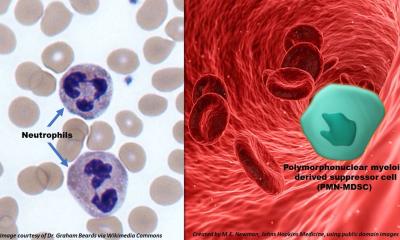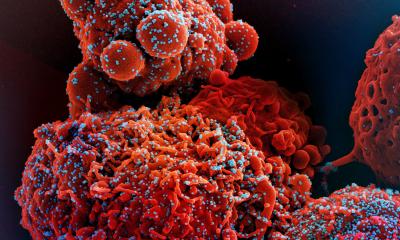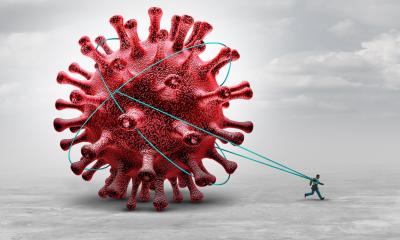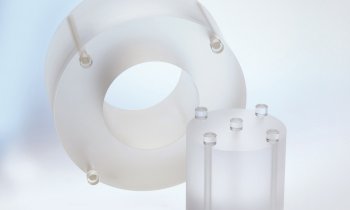Image source: Herusutimbul, Hasil Rapid Test, CC BY-SA 4.0
News • Sensitivity and response detection
How long do tests detect SARS-CoV-2 antibodies? New insights
The Paul-Ehrlich-Institut, in cooperation with the University of Frankfurt am Main, examined the long-term antibody response after SARS-CoV-2 infection in 828 people with different degrees of Covid-19.
The study measured binding antibodies against a range of SARS-CoV-2 target antigens, neutralising antibodies, and antibody binding strength (antibody avidity). Sensitivity, kinetics, and the duration of antibody detection depended on the detected antibody type, test design, target antigen of the anti-SARS-CoV-2 antibody test, antibody avidity, and Covid-19 severity. The Journal of Clinical Virology reported on the results.
The detection of virus-specific antibodies via antibody tests can assist in the diagnosis of both acute and previous SARS-CoV-2 (Covid-19) infections, whereby acute infections are known to occur with or without symptoms. SARS-CoV-2 antibody testing can identify individuals who have been previously infected with SARS-CoV-2, thus helping to determine the extent of SARS-CoV-2 infection amongst the population and to estimate the number of unrecorded infections.
However, SARS-CoV-2 antibody test results are difficult to interpret. First of all, because test results can vary greatly from person to person. In addition, SARS-CoV-2 antibody test results vary greatly in terms of methodology. It is also unclear how long specific antibodies are still detectable after an infection. Therefore, the use of antibody tests for SARS-CoV-2 requires an in-depth understanding of the variations in test sensitivity as well as the time dependence and duration of antibody detection. This was the subject of the present study.
The in vitro diagnostics (IVD) Testing Laboratory at the Paul-Ehrlich-Institut, headed by Dr Heinrich Scheiblauer, in cooperation with the University Hospital Frankfurt am Main, measured antibody responses over a period of more than 430 days after SARS-CoV-2 infection. 828 samples from 390 patients with different degrees of Covid-19 severity were examined using twelve different tests. These tests measured various antibody types (total antibodies, IgG, IgA, IgM), different SARS-CoV-2 target antigens (receptor binding domain (RBD), spike protein (S), and nucleoprotein (N)), neutralising antibodies, and the binding strength of antibodies to antigens (antibody avidity). Test specificity was determined on 676 pre-pandemic samples.
Recommended article

Article • A potentially devastating impact
Covid-19 alters antibiotic use
The long-term impact of the coronavirus pandemic on antimicrobial resistance remains difficult to predict. Infectious diseases consultant Professor Alison Holmes reflects on Covid-19's effect on antibiotic use in hospitals and beyond.
The results show that there is a distinct pattern to the sensitivity and detection duration of anti-SARS-CoV-2 antibody tests. This depended on the test design, the target antigen of the test, the antibody binding strength and the severity of Covid-19 in the period covered by the study. A characteristic feature amongst most patients was increasing antibody binding strength (antibody avidity) over time for the immunogenic SARS-CoV-2 antigens RBD and spike protein. Avidity is a correlate (measure) of antibody maturation and immune memory formation. Total antibody tests, that can measure higher levels of antibody binding strength due to their test design, and are based on RBD or spike proteins. As a result, these tests demonstrated high sensitivity and long detection times with increasing antibody avidity. Antibodies could be detected more than 430 days after infection without a foreseeable end point. Surrogate virus neutralisation tests, which were used to determine neutralising antibodies that inhibit the binding of RBD (which was also used in all currently authorised vaccines) to the ACE2 receptors, also showed a long detection duration of neutralising antibodies of over 430 days. In comparison, RBD-based or spike-based antibody tests, which only detect the IgG, IgA, and IgM antibody types, showed lower baseline sensitivity and decreasing antibody titres over time, although IgG and IgA tests had maintained relatively high sensitivity (test positivity) up to 430 days.
In contrast, nucleoprotein-based tests showed a drop in antibody levels after just 120 days, which also led to a loss of sensitivity in the N-based IgG and IgM tests. This was shown to be related to a corresponding decrease in avidity for the non-immunogenic nucleoprotein. With the exception of IgA antibody tests (96%), the specificity of the antibody tests was high for all tests at >99% and there was no cross-reactivity with endemic human coronaviruses.
This data can contribute to a more targeted application of antibody tests and to correct interpretations of SARS-CoV-2 antibody results in daily diagnostic work. In addition, it can help to determine the duration of potential immune protection against SARS-CoV-2.
Source: Paul-Ehrlich-Institut
24.01.2022











